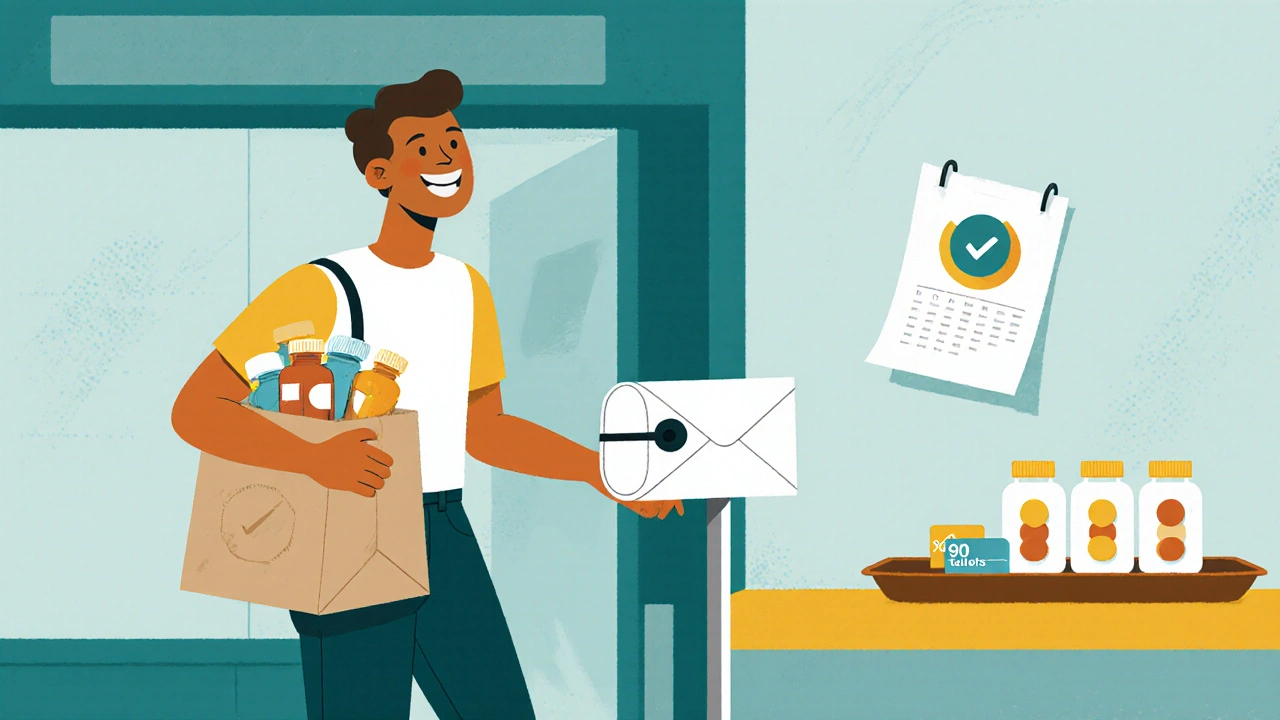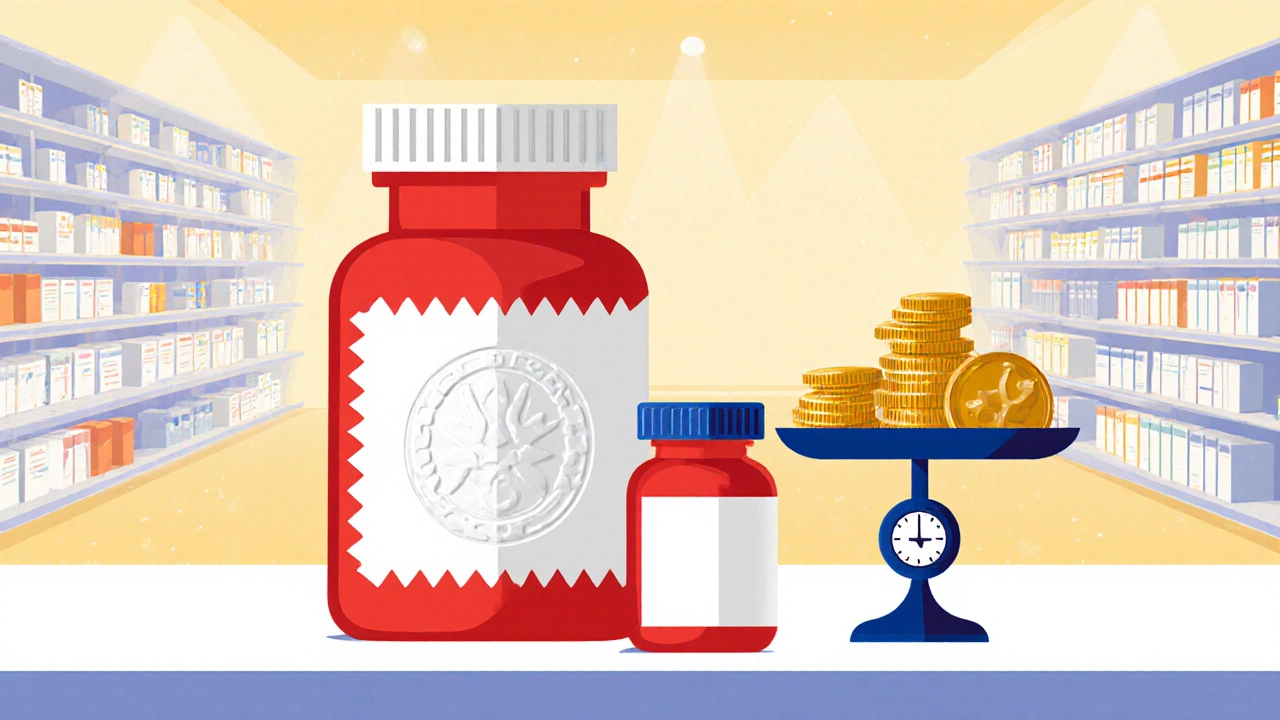Etodolac Cost Comparison Calculator
Enter Your Details
If you’ve been prescribed Etodolac is a non‑steroidal anti‑inflammatory drug (NSAID) used to relieve pain and inflammation. It’s often chosen for arthritis, back pain, and musculoskeletal injuries. you probably glanced at the prescription label and wondered how much it will actually cost you. The short answer is that price varies widely depending on whether you pick a brand‑name product or a generic version, where you fill the script, and what insurance or discount tools you use. Below you’ll find a step‑by‑step breakdown that lets you see the real numbers, understand why they differ, and take action to lower your out‑of‑pocket spend.
What Drives Etomidac Pricing?
Even though the active ingredient is the same, several forces pull the price in opposite directions:
- Manufacturer pricing strategy - Brand‑name makers set a higher list price to recoup research and marketing costs.
- Pharmacy Benefit Managers (PBMs) - PBMs negotiate rebates with manufacturers; the rebates often stay with the insurer, not the patient.
- Insurance plan design - Copay tiers, prior‑authorization rules, and tiered formularies determine how much you pay at the counter.
- Supply chain mark‑ups - Wholesalers, distributors, and the pharmacy itself each add a margin.
- Discount programs - Coupons, manufacturer coupons, and third‑party tools like GoodRx can shave off a big chunk of the cash price.
Because these variables intersect differently for each patient, the same medication can cost $10 in one pharmacy and $45 in another.
Brand‑Name Etodolac (Lodine) - What to Expect
The most recognizable brand for Etodolac in the United States is Lodine, a prescription tablet marketed by Hikma Pharmaceuticals. Although the active ingredient is identical to the generic, brand‑name products usually carry a higher wholesale acquisition cost (WAC). Here’s a snapshot of typical pricing as of October 2025:
- Average retail cash price: $30‑$45 for a 30‑day supply of 300 mg tablets (usually taken twice daily).
- Insurance copay: $10‑$20, depending on whether Lodine sits on a Tier 2 or Tier 3 formulary.
- Availability: Widely stocked at chain pharmacies; smaller independent stores may not carry it.
Many insurers place brand‑name Etodolac in a higher tier precisely to encourage the use of a cheaper generic. If your plan requires a prior‑authorization for the generic, you could end up paying the brand‑name price anyway.
Generic Etodolac - The Low‑Cost Alternative
Generic Etodolac is produced by several manufacturers, the most common being Mylan (now Viatris) and Teva. Because the FDA has approved the generic as therapeutically equivalent, you get the same pain‑relief benefits at a fraction of the cost.
- Average retail cash price: $12‑$20 for a 30‑day supply of 300 mg tablets.
- Insurance copay: $5‑$10 on most formularies, often placed on Tier 1 or Tier 2.
- Pharmacy sources: Available at big‑box stores, mail‑order pharmacies, and most independent pharmacies.
Because multiple companies manufacture the generic, prices can differ by a few dollars between brands. Some discount retailers even offer a “store brand” version that can dip below $10 for a month’s supply.
Side‑by‑Side Price Comparison
| Metric | Brand‑Name (Lodine) | Generic (Mylan/Teva) |
|---|---|---|
| Average Cash Price | $38 | $15 |
| Typical Insurance Copay | $15 | $7 |
| Formulary Tier (US plans) | Tier 3 | Tier 1‑2 |
| Rebate Potential (PBM) | Higher (but often passed to insurer) | Lower |
| Availability (major chains) | Very High | Very High |
Notice how the cash price gap widens when you don’t have insurance. The generic version can save you roughly 60%‑75% off the brand‑name price.
How to Slash Your Etodolac Expenses
Even if your pharmacy lists a price, you can often do better by tapping into discount tools:
- Use coupon websites - Sites like GoodRx and RxCost aggregate price data from dozens of pharmacies. The coupons they generate can cut cash price by $10‑$20 per month.
- Ask for a 90‑day supply - Many insurers cover a 90‑day refill at the same per‑day cost, giving you a built‑in discount.
- Check pharmacy discount cards - Programs like the CVS CareCard or Walgreens Prescription Savings Card often list a lower generic price even for uninsured patients.
- Switch to a mail‑order pharmacy - If your plan includes a mail‑order benefit, you can see up to 30% off the retail price.
- Talk to your prescriber - Some doctors can write a prescription for a different dosage form (e.g., 600 mg extended‑release) that requires fewer pills, effectively reducing the cost per day.
Keep a small notebook or a notes app with the prices you’ve found. When you walk into the pharmacy, you can confidently say, “I saw this medication for $15 at Pharmacy X on GoodRx-can you match that?” Most pharmacists will try to accommodate.

When Generic Isn’t Available - Alternatives and Strategies
In rare cases, a pharmacy may be out of generic Etodolac, especially in rural areas. If you’re stuck, consider these options:
- Ask for a therapeutic equivalent - Ibuprofen (Advil, Motrin) or naproxen (Aleve) are also NSAIDs that can provide similar relief for many conditions. Their cash prices are often lower ($5‑$12 for a month’s supply).
- Switch pharmacies - Large chains like Walmart or Costco often have better purchasing power and can stock generic Etodolac even when a small independent pharmacy cannot.
- Utilize patient assistance programs - Some manufacturers offer free or discounted medication for patients who meet income criteria. While most brand‑name programs focus on brand drugs, a quick search on Drugs.com can reveal if Etodolac qualifies.
Key Takeaways
- The Etodolac cost differs dramatically between brand‑name (Lodine) and generic versions.
- Generic Etodolac typically costs $12‑$20 for a 30‑day supply, while the brand can be $30‑$45.
- Insurance tier placement, PBM rebates, and pharmacy pricing strategies are the main reasons for price gaps.
- Tools like GoodRx, RxCost, mail‑order services, and pharmacy discount cards can lower cash price by up to 50%.
- If generic isn’t available, consider other NSAIDs or switch pharmacies before paying brand‑name rates.
What is the difference between brand‑name Lodine and generic Etodolac?
Both contain the same active ingredient (etodolac) and work the same way. The brand‑name version is marketed under a specific trademark and usually costs more because the manufacturer includes research, marketing, and brand premiums in the price.
Is generic Etodolac covered by most insurance plans?
Yes. Most U.S. pharmacy benefit plans place generic Etodolac on Tier 1 or Tier 2, which leads to lower copays. However, check your specific formulary because some plans still require prior authorization.
How can I find the lowest cash price for Etodolac?
Search price‑comparison tools like GoodRx or RxCost, compare at least three local pharmacies, and ask if they can honor a printed coupon. Mail‑order and pharmacy discount cards can also shave dollars off the list price.
Can I use a 90‑day supply to save money?
Many insurers allow a 90‑day refill at the same per‑day cost as a 30‑day fill. Ask your pharmacy or check your plan’s benefits portal. This often reduces travel time and can lock in a lower price per day.
Are there any risks in switching from brand‑name to generic Etodolac?
No. The FDA requires generic drugs to be bioequivalent, meaning they deliver the same amount of active ingredient into your bloodstream. Some patients notice minor differences in inactive fillers, but these rarely affect efficacy.


Write a comment